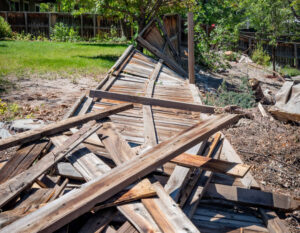
Each time a big storm or high winds impact the Colorado front range there are trees to be cleaned up, and fences to be mended. The tornado that ripped through Highlands Ranch, CO on June 22, 2023 certainly left many homeowners in shock at the level of damage.
Related Read: See fence damage from Highlands Ranch tornado
Now, a few weeks out from the tornado, homeowners may be left in shock for a different reason. Out-of-state fence contractors are coming in to take advantage of Highlands Ranch homeowners and their desire to have their fence fixed quickly. But many of these contractors are not familiar with the Colorado climate and the type of wood that should be used on fences here for long-term durability. Further, they do not have relationships with the homeowners associations or familiarity with the covenants that exist in the neighborhoods of Highlands Ranch.
Unfortunately, homeowners are being taken advantage of and receiving a poor-quality fence that wasn’t built to their HOA standards and it may end up costing them even more than the original fence.
What Out-of-state Fence Contractors Don’t Know, Will Hurt YOU
Sadly, after a natural disaster or crisis affecting homes or livelihood, it’s a common occurrence for shady businesses to take advantage of the vulnerability. Dishonest and unethical companies selling poor quality products often convince someone in a desperate situation to give them their money for what seems like a quick and easy fix to their problem.
When it comes to building a fence or deck in Colorado, local and reputable contractors will know something very important: the type of wood that is appropriate to use in our unique climate. Fence contractors who live and work in Colorado know just how dry it is here and how that affects wood used in outdoor applications.
Non-local contractors who won’t be around after the project is finished, do not have an investment in their customer’s satisfaction, or the community for that matter. Their choice of wood for the fence project is based on what will cost them the least and get the project done the fastest, so they can get out of town quickly.
Recognizing the Wrong Wood for Colorado Fences
Since the tornado in Highlands Ranch, out-of-state fence contractors have arrived to push a “premium redwood upgrade” for fences and promoting redwood as though it’s a quality upgrade at a discount price. There’s a big problem with that: redwood should never be used for fencing in Colorado, or even in the Rocky Mountain region in general. Redwood can’t withstand the extremely low humidity in our state and will bow, twist, or warp quickly.
Redwood can be a good choice for a fence, in the right climate. But not here in Colorado. A local contractor who cares about their work and their customer will know this.
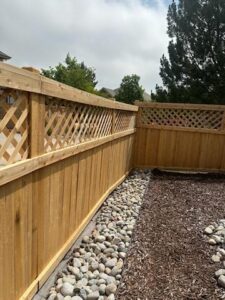
Another wood that should not be used here is Japanese cedar, called CRC; especially new growth CRC. Some contractors will use this to save money, and the homeowner will end up with an awful looking fence in less than a year. Why? Because new growth wood is wet and as the moisture is quickly drawn out of it, the wood will bow and twist easily in this dry climate. Contractors that don’t understand Colorado climate are using new growth CRC on the pickets, posts, and the caps—all parts of the fence.
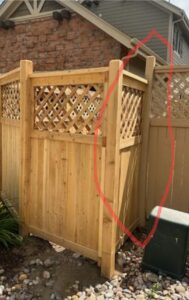
You can distinguish new growth CRC by its light color. And it doesn’t hold its color well over time. After a year the fence will look nearly white, and the surface will look ‘furry’ as the grain has expanded. But you won’t even get a year of a good-looking fence with CRC; it will start to move and lose its shape within weeks of being built.
Quality Fence Contractors Use Appropriate Wood for a Dry Climate
So, what wood is the right choice for fences in Colorado? Integrity Fencing uses Western Red Cedar. We ensure the wood is dried out prior to construction, in our own supply yard. Further, we use appearance grade wood, which means it is rated nice enough to be used inside for a home finish. Make sure you know what you are getting from your fence contractor; some won’t tell you if you don’t ask.
Related Read: Why You Want Your Fencing Contractor to Use Quality Lumber
Did Your Fencing Contractor Contact Your HOA?
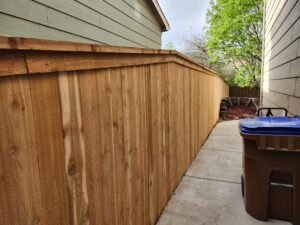
If a fencing contractor is building a fence in a covenant controlled community mere days after a weather event, you can bet they have not worked with the HOA to gain approval or learn the rules to follow.
The HOAs in Highlands Ranch apply strict rules and style guides to the neighborhoods and if the contractors don’t adhere to them, it’s the homeowner who will pay the price. They could end up paying a fine for the violation, and then may have to pay to redo the fence.
Not only do contractors working in Highlands Ranch need to get approval from the HOA they are working within, they also need to know the specific style of fence that is allowed there. The typical fence style in Highlands Ranch is top cap fascia with a certain sized picket. Dog eared fences and alternating fences are not allowed in Highlands Ranch, yet some contractors were building those in the weeks after the tornado to make a quick buck.
Homeowners risk HOA violation and a fee for going against the HOA rules, something an out-of-state contractor doesn’t care about once the job is finished.
Buyer Beware: A Low-Cost Fence Means a Low Quality Fence
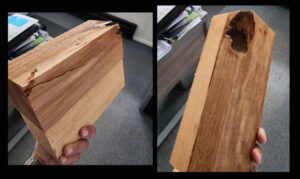
If there’s a big price difference between contractors you receive bids from, find out what kind of wood they are using and from where they source it. If the price seems too good to be true, the contractor is likely getting their wood from a big box lumber store, which stocks the lowest quality wood, and is often not fully dried out.
Additionally, a cheaper fence probably means the contractors aren’t going deep enough into the ground for posts; not at the depth the posts should be to withstand wind and the general weight of the fence. Lastly, a cheap bid means the fence contractor is not likely to take care around your property and trees during construction, or provide dirt clean up.
Fencing is truly a product where you get what you pay for.
Related Read: The Real Value of a Dollar When Choosing a Fencing Contractor
6 Questions to Ask a Fence Contractor Before You Choose Them
Avoid a costly mistake with a poor-quality contractor by asking the following questions to ensure a quality result:
- Are you licensed with general liability insurance? (Then request to see their certificate of insurance)
- Is your business local to the area? To Colorado? (This will tell you if they are familiar with this area and climate)
- Have you contacted our HOA? Do you know the covenant restrictions and rules you need to follow to build a fence in this neighborhood?
- Do you know the style of fence that is allowed in this HOA?
- What type of wood will you be using for the fence pickets, posts, and caps?
- Where do you source your wood from?
